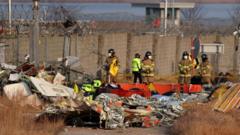More than 170 people have perished in a devastating plane crash in South Korea, with authorities investigating the potential causes, including adverse weather and bird strikes. The incident marks a dark moment in the country's aviation history, prompting national mourning and urgent safety inspections across the airline sector.
Tragedy Strikes: South Korea's Deadliest Plane Crash Claims Over 170 Lives

Tragedy Strikes: South Korea's Deadliest Plane Crash Claims Over 170 Lives
A Jeju Air plane crash at Muan International Airport results in a significant loss of life, prompting investigations into the cause of the disaster.
A catastrophic plane crash in South Korea on Sunday morning has left over 170 individuals dead. Eyewitness accounts and distressing video footage reveal that the Jeju Air flight, which was in the process of landing, veered off the runway at Muan International Airport, striking a barrier and subsequently engulfing in flames. The aircraft was returning from Bangkok, Thailand, carrying a total of 181 people, including 179 passengers who tragically lost their lives. The sole survivors appear to be two crew members rescued from the wreckage.
Preliminary investigations suggest that factors such as a possible bird strike and challenging weather conditions could have contributed to the disaster. Experts caution that multiple elements may have played a role in the crash. The flight, designated 7C2216, was a Boeing 737-800 operated by Jeju Air, the most prominent low-cost carrier in South Korea. Moments before the crash, at approximately 08:54 local time, air traffic control issued a warning about bird activity, only to have the pilot report a potential strike at 08:59. The pilot declared a "mayday" and attempted to execute a go-around, seeking permission for an alternate landing direction.
Despite these efforts, the aircraft struck the ground in a troubling manner; it appeared to land without deploying any landing gear, skidded off the runway, and crashed into a wall before erupting into flames. Witnesses describe hearing a loud explosion followed by severe detonations. Rescue operations revealed two survivors found in the tail of the aircraft, with a fire chief later stating the rest of the plane was unrecognizable.
While officials investigate the precise cause of the accident, South Korea's transport department confirmed that the head pilot had extensive experience in the role, and Jeju Air boasts a commendable safety record. Authorities are currently examining flight data and voice recorders, which will require significant time to analyze due to damage sustained in the crash.
The flight had a diverse mix of passengers, including two Thai nationals, making it a significant loss for many families. Sadly, five of the deceased were children under ten, further deepening the tragedy. As residents grapple with the tragedy, families await news of their loved ones, with genetic samples being collected for victim identification.
In the wake of the crash, South Korea's acting president has mandated emergency airline safety inspections across the country, designating Muan as a special disaster area and instating a national period of mourning. Jeju Air has publicly expressed its condolences and commitment to cooperating with investigations, amidst a suspension of all flights to and from Muan International Airport.
As the nation mourns, the aviation sector awaits a clearer understanding of what led to one of South Korea's worst air disasters in history.




















